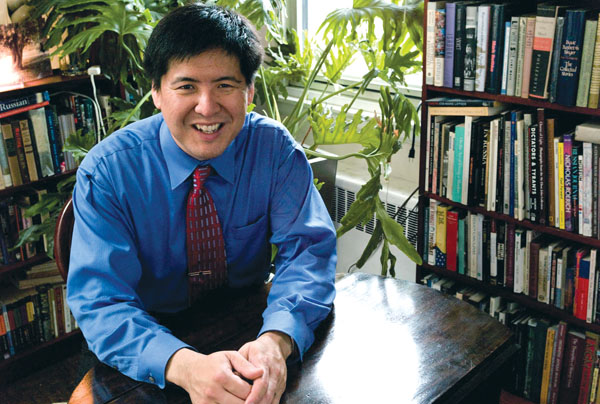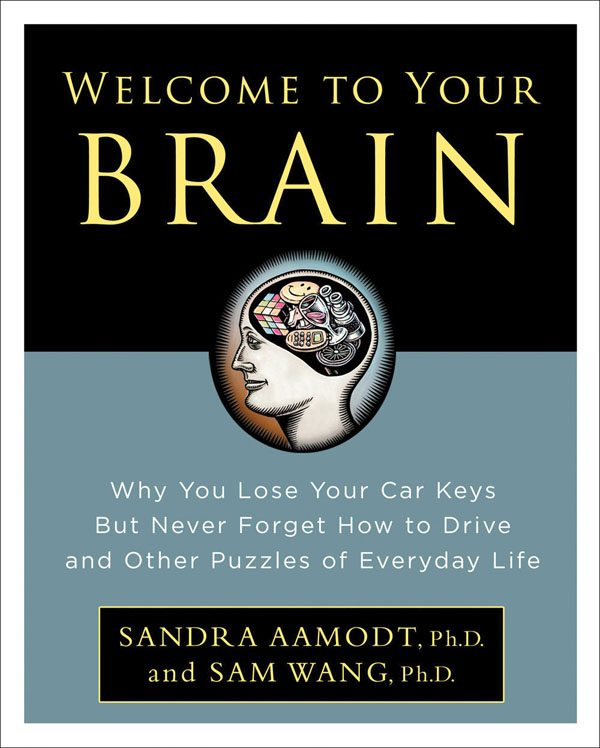A primer on the brain
Sam Wang explains why we lose our keys but never forget how to drive
When people find out that Sam Wang is a neuroscientist, they often pepper him with questions like: Do we really use only 10 percent of our brains? Does drinking kill brain cells? And will listening to Mozart make babies smarter? (The answer to all three is no.) With co-author Sandra Aamodt, editor-in-chief of the scientific journal Nature Neuroscience, Wang has answered those questions in Welcome to Your Brain: Why You Lose Your Car Keys But Never Forget How to Drive and Other Puzzles of Everyday Life. Published by Bloomsbury in March, the book provides an overview of how the brain works and debunks myths and ideas that are embedded in popular culture. Wang, an associate professor of molecular biology and neuroscience at Princeton, spoke with PAW’s Katherine Federici Greenwood.
What is the most widespread myth about our brains?
That we use only 10 percent of our brains. The earliest mention [of the myth] that we were able to find was in the writings of the great speaker but non-neuroscientist, Dale Carnegie. In his speeches Carnegie said this was a fact discovered by the elder of psychology, William James. But James wrote that we use only a small fraction of our brain’s full potential. That idea, which is inspirational and helps motivate people to try harder, turned into a very scientific-sounding statement by Carnegie. In fact, our brain is a very efficient device, and we use all of it.
In your book you address a question I often wondered about: Why can’t we tickle ourselves?
Because one thing our brains do is predict what a movement will feel like. Your body turns down the volume on sensations that are caused by your own movement. So any time your brain generates a command to, say, move your hand and touch your neck, it sends other information within your brain that says “I’m moving my hand” and that you may expect a sensation that feels like that. But when someone else touches you, you feel that sensation more strongly because you’re not generating a movement that predicts that sensation. The brain region that is probably involved in this is the cerebellum.
Why might someone forget where he put the car keys but remember something that happened when he was a child?
We think of memory as one thing that our brains do, but our brains have about half a dozen different types of memory that use different brain regions. So it’s possible to have trouble in one type of memory and to have less trouble in another type of memory. Short-term memory — such as keeping track of your car keys, recalling a phone number, or recalling a fact — begins to decline in people starting in their 30s. Short-term memory requires the hippocampus and other nearby structures. The hippocampus shrinks as you age, which may account for decline in function. Your long-term memories, such as things that happened at the age of 5, get stored elsewhere. It’s thought that factual memories get laid down in the hippocampus and then over time get transferred out to the cerebral cortex. Long-term memory is therefore stored in a more secure fashion, making it possible for a person to remember events clearly from many years ago while having difficulty with more recent events.
What can people do to maintain healthy brain function later in life?
Have an intellectually engaged lifestyle and undertake physical exercise. People who engage in fitness training to get the heart rate up, and who do intellectual work for a living or who have complex intellectual hobbies like learning a language or bridge, are more likely to retain executive function. Executive function, which begins to decline in people’s 70s and 80s, is a set of abilities including self-control, making plans for the future, and decision-making. The more education you have, the more likely it is you will maintain healthy brain function later in life. Physical exercise increases blood flow to the brain and the amount of energy available to the brain. The short slogan in the book is if you do physical things for a living, you should get an intellectual hobby. If you do intellectual things [for a living], you should get a physical hobby.














No responses yet